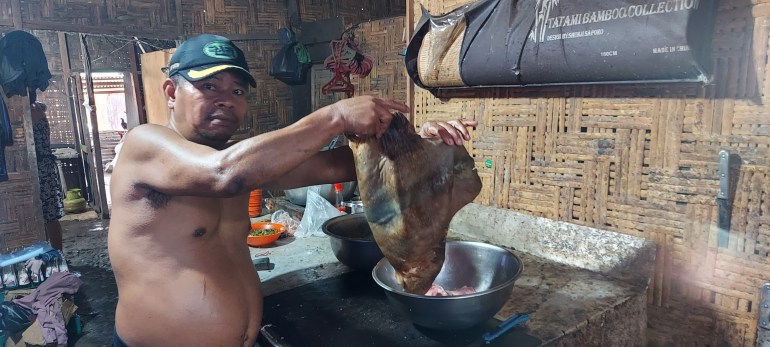In Indonesia, dog meat business booms despite welfare concerns | Business and Economy
Medan, Indonesia – For civil servant Silas Sihombing, the reasons for eating dog meat could not be much simpler.
“Today I’m eating dog because I’m hungry,” Sihombing told Al Jazeera in between mouthfuls of grilled dog meat at Lau Dimbo Simalem restaurant in Medan, North Sumatra.
“And look, it’s making me sweat. Dog will do that, the meat makes you feel hot.”
Dog meat restaurants are found all over Medan, where the Indigenous Batak people are known for their taste for the protein.
About 7 percent of Indonesians are estimated to eat dog meat, according to Dog Meat Free Indonesia, a group that campaigns against the dog meat trade.
Although 87 percent of Indonesia’s 270 million people are Muslim and view dog products as haram, or forbidden, in the same way as pork, about 9 percent of the population is Christian.
Dog meat is most often eaten in predominantly Christian parts of the country, such as North Sumatra, North Sulawesi, and East Nusa Tenggara, where just 9 percent of the population is Muslim.
While animal rights groups object to the trade on the grounds that it promotes cruelty and poses public health risks such as rabies outbreaks, many Indonesians see eating dog meat as no different than consuming chicken or beef and balk at the suggestion that it should be banned.

Dicky Senda, a writer and food activist based in Mollo, East Nusa Tenggara, said the dog meat trade has boomed in the province in recent years, as evidenced by a mushrooming of stalls selling canines cooked with aromatic spice blends.
“According to our research, Mollo people didn’t traditionally eat dogs,” Senda told Al Jazeera.
“Dogs are important animals in Mollo culture that are considered friends and relatives. That’s why a dog’s paw print is a common motif in the woven fabric of the Mollo people. As a farming and hunting community, dogs are considered helpful animals.
“I don’t know when it started exactly, but now eating dogs has become more and more popular.”
The popularity of dog restaurants in East Nusa Tenggara has grown to the point where dog meat traders have struggled with supply and demand, Senda said.
That in turn has fuelled a trend of unscrupulous scouts poisoning dogs on the streets with food laced with potassium, which renders the animals unconscious but does not affect the meat.
“I’ve lost five or six dogs in the past few years that way,” Senda said.

As a result of such practices, which have been reported across the country, Dog Meat Free Indonesia has for years lobbied the government to ban dog meat, and a number of local governments have made selling dog meat illegal in their vicinity.
Last year, a dog meat trader in Central Java became the first person to be prosecuted for his role in the trade. The trader was handed a 10-month prison sentence and a fine of $10,000 after more than 70 dogs were found packed in a truck for transport to dog meat cafés and restaurants.
On July 6, a letter signed by Medan’s Mayor, Bobby Nasution, stating that the sale or trade of dog meat was prohibited was made public.
Following an outcry, a spokesperson for the Mayor’s office clarified that the letter did not prohibit the consumption of dog meat but was only a “suggestion”.
Back in Medan, Sihombing, who has been eating dog since he was a child, cannot see any reason to ban the meat, which he considers delicious, not least because it is typically lacking in fat.
According to the dog connoisseur, the rump of the animal is the tastiest part.
“You can’t kill tigers or elephants because they’re endangered and breeding more of them is difficult, but there are plenty of dogs. When they give birth, they usually have large litters of puppies,” he said.
“What is the legal reason why you shouldn’t be allowed to kill and eat a dog if you can kill and eat other animals?”

Maria Tarigan, the owner of Lau Dimbo Simalem, said that while not all Batak people eat dog, many favour the meat for its supposed medicinal purposes, which include unproven claims that it can cure disease.
“Dog meat is meant to be good for typhus and dengue fever and it’s even good if you have COVID,” Tarigan said. “I’m proof of that. I was sick with COVID and then I drank dog soup and it made me better.”
During the height of the pandemic, the restaurant did a roaring trade in dog soup, Tarigan said, as customers flocked there and ordered bags of it for sick relatives convalescing in hospital.
But being the owner of a dog meat restaurant also comes with its own specific set of challenges.
Tarigan said her application to register as a business with GoFood, a popular Indonesian online food delivery app, was denied, although she was able to list her restaurant on GoShop, the shopping section of the app, as a compromise.
Tarigan said that she suspects she was not able to register because her restaurant only serves dog meat dishes and nothing else.
“We have 20 agents that we source our dogs from,” she said. “They call me and tell me when they have dogs in stock. We get our dogs from different places. If a dog has puppies, the owners may sell the puppies they don’t want to us.”
Tarigan said that her restaurant usually kills three or four dogs per day to keep up with demand, slaughtering 21 dogs each week.
“If I had a dog and something happened to it, of course I would cry, especially if it had been with me everyday and wagged its tail when I came home,” said Tarigan.
“If it was by my side all day long, of course I would be attached to it, but really, what’s the difference with eating another animal?”

Pingback: garbage information
Pingback: ฝาก 10 รับ 100
Pingback: Betty
Pingback: freshbet
Pingback: pin up casino